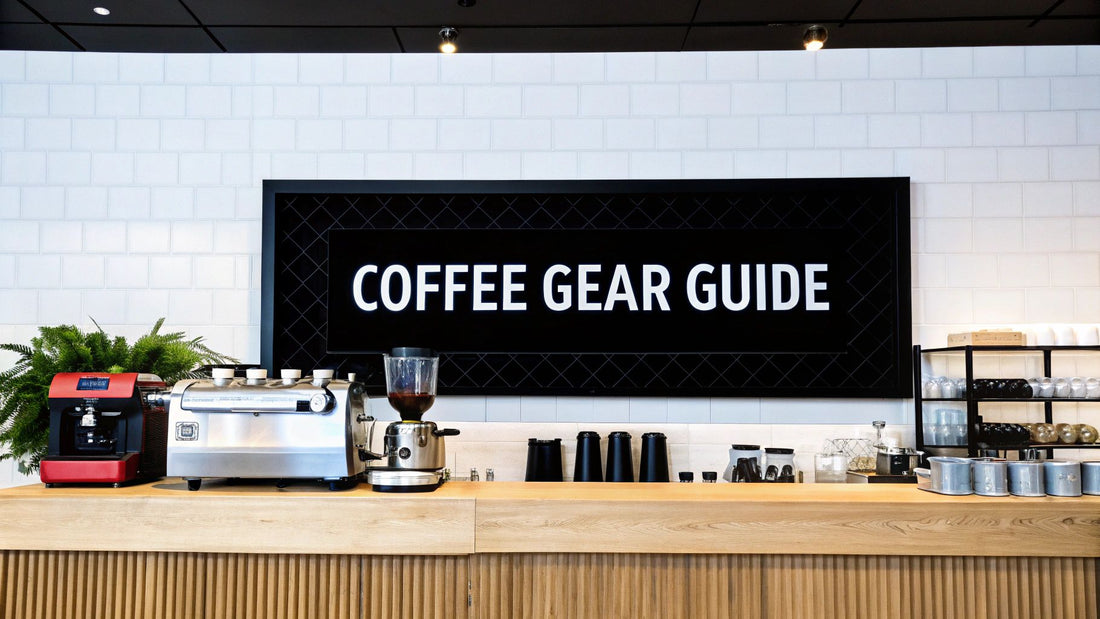
A Founder's Guide to Speciality Coffee Shop Equipment in the UK
Share
Opening a coffee shop is all about crafting an experience, and your coffee shop equipment is the toolbox you'll use to build it. For anyone dreaming of opening a cafe in the UK, getting the gear right is the first real step toward creating a beloved local spot. This isn't just about making a shopping list; it’s about laying the foundations for your business's heart and soul.
Building Your UK Speciality Coffee Dream
Starting a new coffee shop is an incredible journey. That aroma of freshly ground beans, the hum of a perfectly tuned espresso machine, and the familiar faces of your regulars—it’s all part of the vision. But before you pour your first flat white, the choices you make about your equipment will set the stage for your entire operation. Think of this guide as your roadmap for navigating the UK's vibrant and competitive speciality coffee scene.
We’re going to look beyond simple checklists and get to the soul of your future cafe. Your espresso machine isn't just a tool; it's the captivating centrepiece of your bar. Your grinder isn't just an accessory; it's the key that unlocks the complex, hidden flavours in every single bean you source.
The right equipment does more than just make coffee. It empowers your baristas, defines your workflow, and communicates your commitment to quality to every person who walks through your door.
This is all about making smart, strategic decisions that tell your brand's unique story. Choosing the right coffee shop equipment isn't just about function—it’s about building a resilient, profitable business that can truly stand out in the UK market.
Setting the Foundation for Success
The equipment you choose has a direct impact on the most critical parts of your business:
- Consistency: High-quality machines are your guarantee that every drink meets the high standards your customers expect, from the first cup of the day to the last.
- Efficiency: A well-designed equipment layout lets your team fly through the morning rush, keeping queues short and sales high.
- Brand Identity: The gear you choose, from a sleek Italian espresso machine to artisanal hand-brewing tools, instantly tells a story about your cafe's values and expertise.
Let’s dive into how each bit of kit contributes to your unique vision and sets you up for success.
The Espresso Machine: Your Cafe's Centrepiece
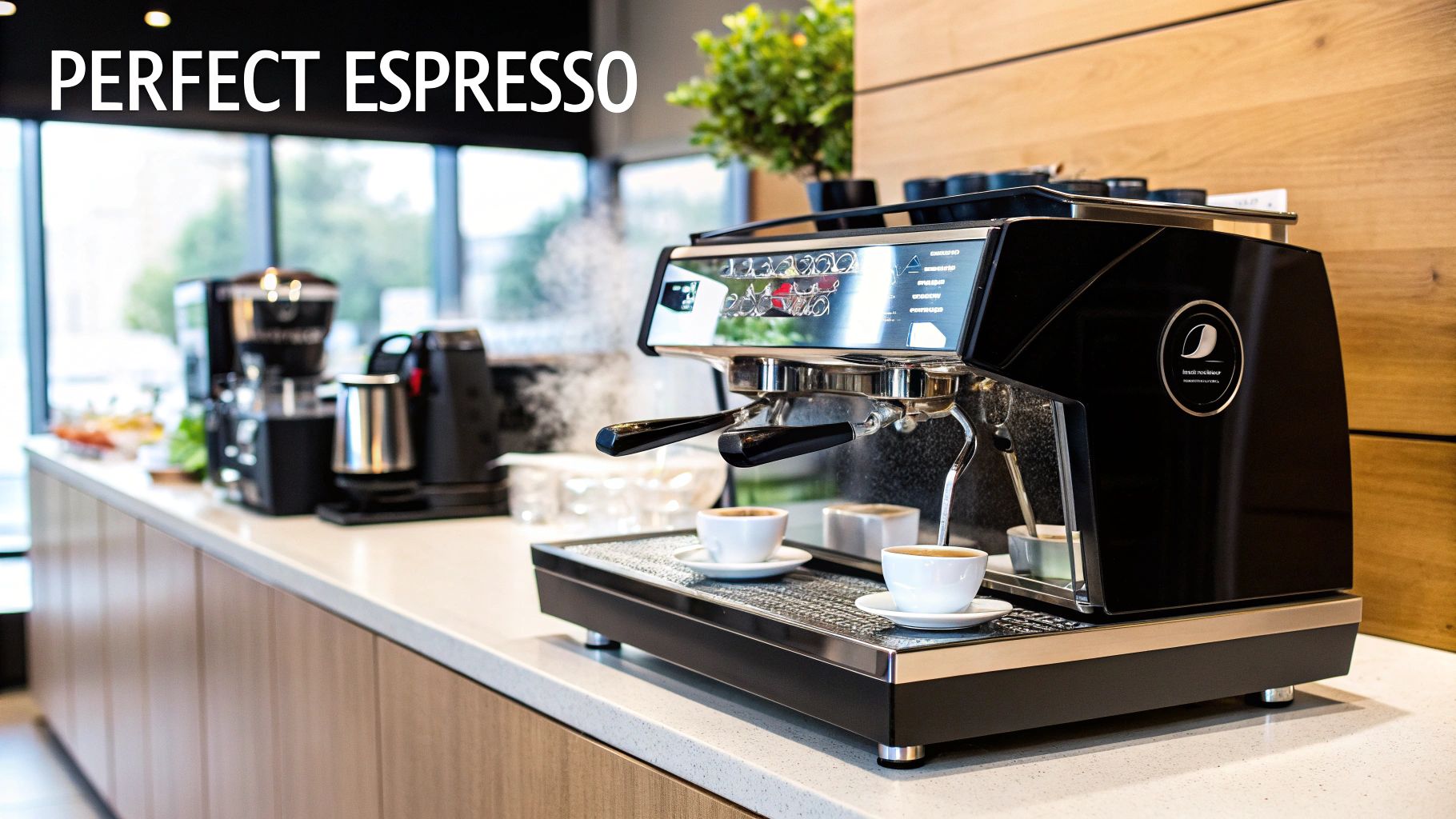
Let’s be honest, the espresso machine is the undeniable heart of any coffee shop. It's the engine that powers every latte and flat white you serve, and it's the main tool your baristas will use to show off their craft. Choosing the right one isn't like buying an appliance; it's more like casting the lead role in your daily performance.
This single piece of coffee shop equipment really sets the tone for your whole operation. It dictates your workflow, the quality of your drinks, and even the look and feel of your space. It's a decision that goes far beyond aesthetics—it’s about matching the machine’s power to your cafe's ambition, especially in the UK's buzzing speciality coffee scene.
Traditional Control or Automated Consistency?
Your first big decision is whether to go for a traditional semi-automatic machine or a modern super-automatic model. Each one takes a completely different approach to making coffee, and they suit different business models and skill levels.
- Semi-Automatic Machines: These are the classic workhorses you see in most speciality cafes. They put the barista in the driver's seat, giving them full control over grinding, tamping, and pulling the shot. It takes a skilled hand, but it’s this control that allows them to dial in every variable and produce truly exceptional espresso.
- Super-Automatic Machines: Built for speed and consistency, these machines do everything from grinding the beans to pouring the coffee at the touch of a button. They cut down on the need for in-depth barista training but leave little room for the hands-on artistry that makes speciality shops stand out. They're often a better fit for high-turnover spots where speed is everything.
For a new speciality coffee shop in the UK, a semi-automatic machine is almost always the right call. It immediately signals that your brand is all about craft and quality, giving your team the tools to deliver a premium, hands-on experience that customers are looking for.
Key Features for the UK Market
When you're investing in an espresso machine, there are a few technical specs that are non-negotiable for keeping up with a busy UK cafe. Think of it like a chef choosing an oven; the right features mean you can perform flawlessly when the pressure is on.
A multi-boiler system is a perfect example. These machines have separate boilers for brewing espresso and steaming milk. That means a barista can pull a perfect shot at a precise 93°C while steaming milk for a latte at the same time, without one process messing with the other's temperature. That stability is absolutely vital for maintaining quality and speed during the morning rush.
An espresso machine with a Proportional-Integral-Derivative (PID) controller is your best friend for temperature stability. It's like a hyper-intelligent thermostat, constantly making tiny adjustments to keep the water temperature exactly where you set it, giving you perfect consistency from one shot to the next.
You also need to think about the number of groupheads—that’s the part of the machine where you lock in the portafilter. A two-group machine is the standard for most small to medium-sized cafes, letting two baristas work side-by-side. If you’re in a high-traffic city centre, a three or even four-group machine might be a necessary investment to keep the queues moving.
Protecting Your Investment
Your espresso machine is a massive financial commitment, so looking after it is a top priority. Build quality is key. Look for machines made with durable materials like stainless steel and brass components that can handle the wear and tear of a commercial environment, day in and day out.
Even more important here in the UK is finding a supplier that offers a solid local service contract. When a machine breaks down, every minute of downtime is lost revenue and unhappy customers. A reliable, UK-based technician who can get to you quickly isn't a luxury—it's an essential insurance policy for your business.
This focus on quality and support is part of a bigger picture. The European commercial coffee machine market, which includes the UK, is set to grow steadily, thanks to the ever-increasing demand for speciality coffee. Europe currently makes up about 32% of the global market revenue, a figure driven by advances in automation, energy efficiency, and eco-friendly designs. You can discover more about the trends in the European coffee machine market and see how your choice fits into this expanding industry. By picking a durable, well-supported machine, you're setting yourself up for success from day one.
The Coffee Grinder: The Secret to Great Flavour
If the espresso machine is the heart of your operation, the coffee grinder is most definitely its brain. It's the unsung hero that quietly dictates the quality and flavour of every single cup you serve. While a gleaming, high-tech espresso machine often steals the spotlight, savvy cafe owners know that investing in a superior grinder is arguably the most impactful decision you can make for your coffee's taste.
This single piece of coffee shop equipment is where the magic really begins. It transforms whole beans into the precise particles needed for a perfect extraction, unlocking all the complex flavour potential your roaster worked so hard to create. It's not just an accessory; it’s an equal and essential partner to your espresso machine.
Burr Type: Flat vs Conical
At the core of any professional grinder are its burrs—the sharp, cutting surfaces that do the hard work of crushing coffee beans. In the speciality coffee world, the two dominant types are flat and conical, and their geometry has a profound effect on how the final espresso tastes.
Imagine flat burrs as two identical, stacked rings with sharp teeth on their inner faces. As they spin, beans are drawn between them and ground into very consistently shaped particles. This uniformity often leads to espresso shots with incredible clarity, highlighting bright, clean, and sweet flavour notes.
Conical burrs, on the other hand, feature a cone-shaped inner burr that sits snugly inside a ring-shaped outer burr. This design creates particles of two distinct sizes (a bimodal distribution), which can result in a fuller, heavier body and a richer texture in the espresso. The choice isn't about which is better, but about which style best suits the flavour profiles you want to showcase in your UK cafe.
The Power of Particle Uniformity
So, why all this fuss about the shape and size of ground coffee? It all comes down to achieving a balanced extraction—the art of pulling just the right amount of soluble flavour compounds from the coffee grounds. And that's only possible with particle uniformity.
When your coffee grounds are all a similar size, water flows through them evenly, extracting flavour at a consistent rate. Inconsistent grinds lead to a mix of over-extracted (bitter) and under-extracted (sour) coffee in the same shot, completely destroying the balance.
Think of it like cooking different-sized chunks of potato in the same pot; the small bits turn to mush while the big ones stay raw. A high-quality burr grinder acts like a skilled chef, making sure every single particle is perfectly prepared for brewing. This consistency is the foundation of every delicious coffee you’ll serve.
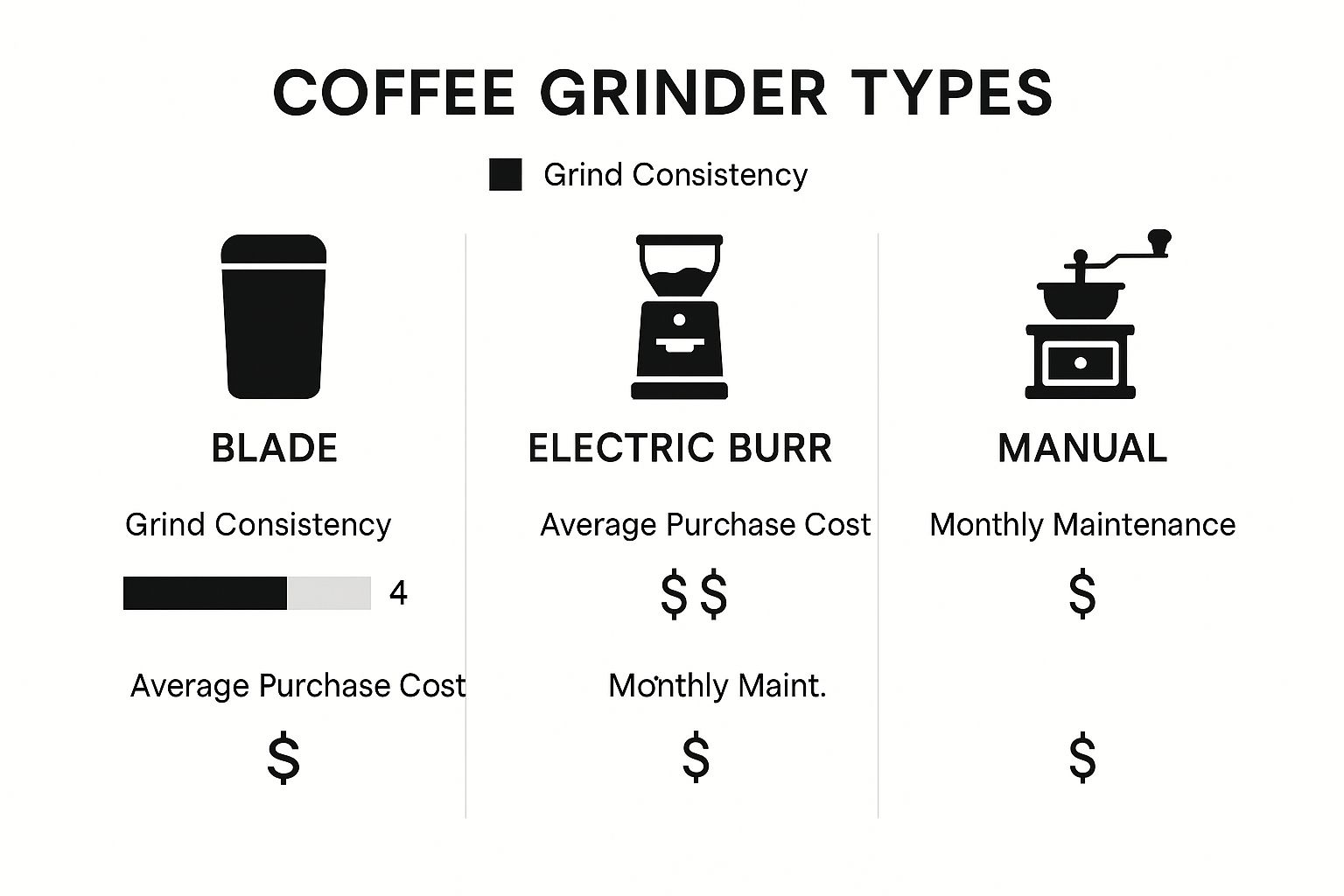
On-Demand vs Doser Grinders
Finally, you need to think about your workflow. In the fast-paced environment of a UK coffee shop, how you get the ground coffee from the grinder to the portafilter matters—a lot. Your two main options are on-demand and doser grinders.
An on-demand grinder grinds the exact amount of coffee you need for each shot, directly into the portafilter, seconds before you brew. A doser grinder, however, pre-grinds a larger batch of coffee into a holding chamber, which you then dispense using a lever.
Here’s a quick breakdown of how they stack up for a modern UK cafe.
On-Demand vs Doser Grinder Comparison for UK Cafes
| Feature | On-Demand Grinder | Doser Grinder | Best For UK Cafe Type |
|---|---|---|---|
| Freshness | Maximum freshness. Beans are ground seconds before brewing, preserving volatile aromas. | Lower freshness. Pre-ground coffee stales quickly in the dosing chamber. | Any speciality cafe focused on quality and flavour. |
| Waste | Minimal waste. Only the exact amount needed for a shot is ground. | Higher waste. Stale coffee in the doser often needs to be discarded. | Cafes prioritising cost control and sustainability. |
| Consistency | Highly consistent. Modern electronics ensure precise dosing every time. | Less consistent. Dosing can be imprecise, relying on manual lever pulls. | High-volume shops where shot-to-shot consistency is critical. |
| Workflow | Streamlined for quality. Baristas work with one shot at a time, ensuring focus. | Faster for high volume (historically). Can be quick but sacrifices quality. | Very high-volume traditional setups, though increasingly rare. |
| Cost | Generally a higher initial investment due to advanced technology. | Lower upfront cost, but can lead to higher long-term waste costs. | Budget-conscious setups, but a false economy for speciality coffee. |
For any speciality coffee shop in the UK focused on quality, flavour, and efficiency, an on-demand grinder is the undeniable winner. It guarantees every customer gets a coffee made from beans ground moments before brewing, delivering the freshest possible experience and upholding your commitment to excellence.
Building Your Menu With Essential Brewing Gear
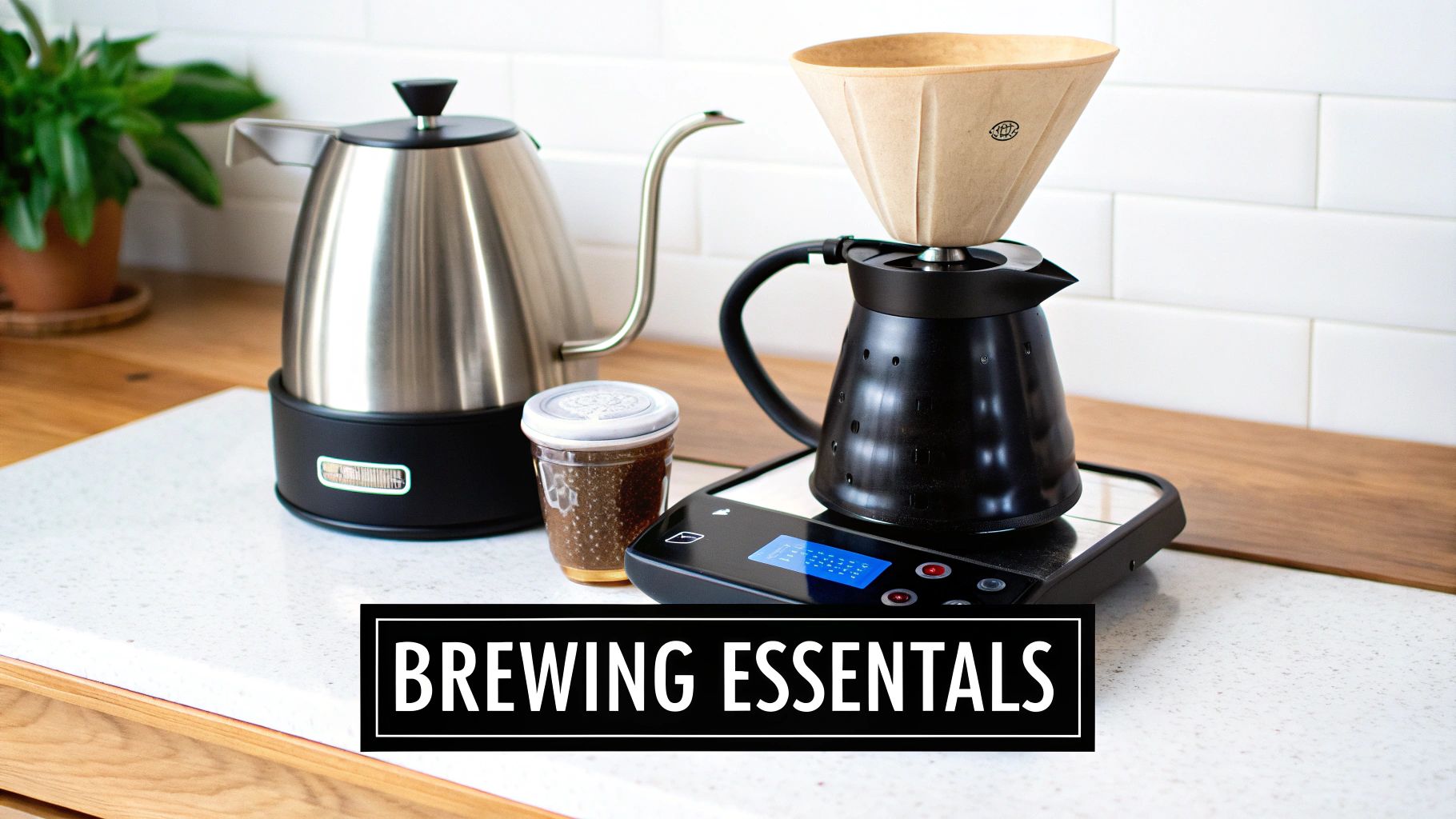
While the espresso machine is undoubtedly the star of the show, any modern UK coffee shop worth its salt knows that customer tastes are wonderfully diverse. Going beyond espresso isn't just about adding more lines to your menu; it’s a smart move to attract a wider crowd, create new revenue streams, and cement your reputation for genuine coffee expertise. This is where your other brewing and support coffee shop equipment steps in, turning your menu into a genuinely exciting experience.
This gear helps you cater to everyone. You'll be ready for the office worker needing a quick, quality filter coffee and the coffee enthusiast looking for a meticulously hand-brewed cup. It's about building a complete drinks programme that makes your shop the destination, whatever the time of day.
The Batch Brewer: The Workhorse of the Morning Rush
That hectic morning rush can create a serious bottleneck at the espresso machine. The batch brewer is the unsung hero that solves this problem, pumping out consistently brilliant filter coffee in large volumes, fast. Think of it as your most dependable team member—always ready, always consistent, and freeing up your baristas to focus on their craft.
Forget the scorched, stewed coffee you might remember from old diners. Today's batch brewers are a different beast entirely, offering precise control over water temperature, bloom times, and pulse brewing. They allow you to brew litres of delicious, perfectly repeatable filter coffee, ensuring customers in a hurry get a superb cup without the wait. That keeps the queue moving and the sales flowing.
Creating an Experience with Manual Brewing
For the true coffee aficionado, nothing quite beats the theatre of a manual brew. Setting up a dedicated pour-over bar with kit like the V60, Kalita Wave, or an AeroPress creates an engaging, personal experience for your customers. It’s a brilliant opportunity for your baristas to connect, share the story behind the beans, and really show off their skills.
This hands-on approach offers some real perks:
- Showcasing Premium Beans: Manual brewing is the perfect stage for your most prized single-origin coffees, allowing their delicate, complex flavour notes to really sing.
- Customer Engagement: The slow, deliberate process is captivating to watch and invites conversation, turning a simple transaction into a memorable interaction.
- Elevated Brand Perception: Offering a hand-brewed option signals a deep commitment to quality and craft, setting you miles apart from the big high-street chains.
A dedicated brew bar transforms a section of your counter into a performance space. It tells customers, "We care deeply about coffee in all its forms," building a loyal following among true coffee lovers.
Essential Support Systems Beyond Coffee
A successful menu has to think beyond just coffee, and having the right support equipment is vital for meeting those broader customer demands. These tools work quietly in the background to make sure your entire drinks offering is top-notch.
A high-performance commercial blender is a must if you plan to offer smoothies, frappes, or other blended drinks, especially in the warmer months. Look for models with sound-dampening enclosures to keep your café’s atmosphere calm and welcoming. In the same vein, a dedicated hot water tower is essential for your tea-drinking customers. It gives you instant, temperature-controlled water without tying up your espresso machine, guaranteeing a perfect brew for tea lovers every single time.
This diverse kit reflects a wider trend. The UK coffee market is projected to hit £7 billion in 2025, with the speciality sector potentially pushing that to £9.2 billion by 2030. This growth is driving sales of advanced commercial brewing equipment as customer expectations continue to rise. You can discover more about the evolving UK coffee market on worldcoffeeportal.com to see how your equipment choices fit into the bigger picture.
The Critical Role of Water Filtration
Finally, we come to the most important—and most overlooked—piece of equipment in any coffee shop: a water filtration system. Coffee is over 98% water. That means the quality of your water directly dictates the flavour of every single drink you serve. More importantly for UK businesses, our water hardness varies wildly from one region to the next.
Hard water is full of minerals like calcium and magnesium, which are a nightmare for your expensive machines. Over time, these minerals build up as limescale, clogging pipes, ruining heating elements, and eventually causing catastrophic failure. A properly specified water filter is your first line of defence. It protects your investment and prevents costly downtime by stripping out impurities and balancing the mineral content. This not only safeguards your gear but also unlocks the true, vibrant flavours of your coffee beans.
How to Source and Finance Your Equipment
So, you’ve got a wishlist of shiny new gear. Fantastic. Now for the tricky part: turning that dream into a reality without draining your startup funds before you’ve even served your first flat white. This is where smart financial planning comes in.
We’re going to walk through the practicalities of getting your equipment sorted here in the UK. First, we'll tackle the big debate: brand-new versus professionally refurbished gear. Then, I’ll share what to look for in a UK supplier—because a good one is a partner, not just a seller. Finally, we'll get into the money side of things: leasing, hire purchase, or buying it all outright. Getting this right is crucial for your cash flow and the long-term health of your new venture.
New vs Refurbished Equipment
One of the first big decisions you'll face is whether to buy everything new or go for expertly refurbished coffee shop equipment. There are solid arguments for both.
Brand-new machines are tempting. They come with the latest tech, a full manufacturer's warranty, and that undeniable peace of mind. But, and it's a big but, they carry a premium price tag that can really stretch an early-stage budget.
This is where refurbished equipment becomes a seriously compelling alternative, especially when sourced from a reputable UK supplier. We’re not talking about old, tired machines here. These are often ex-display models or gear from cafes that have recently upgraded or closed. When they’ve been professionally serviced and are sold with a warranty, you can get incredible performance for a fraction of the cost. That frees up vital cash for other essentials like marketing, staff, or top-tier beans.
Finding Trusted UK Suppliers
Choosing your supplier is just as important as choosing your espresso machine. A great supplier is a long-term partner, someone who offers far more than just a piece of kit. You're looking for a company that provides a complete package of support, tailored specifically for the UK market.
Your ideal supplier should provide:
- Warranties and Support: Make sure any equipment, new or refurbished, includes a solid warranty and gives you access to qualified, UK-based technicians. You don't want to be waiting weeks for a part to arrive from overseas.
- Installation and Training: A good partner won’t just drop a pallet at your door. They’ll handle the installation and give your team the initial barista training needed to get the best out of the machine.
- Proven Reputation: Do your homework. Look for suppliers with glowing testimonials and a long, established history in the UK speciality coffee scene.
The UK's coffee market is absolutely booming. The branded coffee shop sector has seen remarkable growth, creating massive demand for commercial coffee machinery and making it more critical than ever to team up with a reliable supplier you can count on. You can discover more insights about the UK coffee market’s growth on lumina-intelligence.com.
Understanding Your Financing Options
Once you've found your suppliers, it's time to talk strategy. How you decide to pay for your equipment will have a direct impact on your startup’s cash flow and its financial stability down the line.
Your financing method is a strategic decision, not just a purchase. The right choice protects your cash reserves, enabling you to invest in marketing, staff, and inventory during the critical opening months.
Let's break down the main ways to handle it:
- Outright Purchase: This is the most straightforward route. You buy your equipment upfront, which means you own it from day one and don’t have to worry about interest payments. In the long run, it’s the cheapest option. The catch? It requires a huge initial capital investment that simply isn't realistic for most new businesses.
- Leasing: A very popular choice for UK startups, and for good reason. You're essentially renting the equipment for a fixed period, paying a manageable monthly fee. This is brilliant for preserving cash flow, and many contracts even bundle in maintenance and servicing. When the term is up, you can usually upgrade to a newer model, extend the lease, or buy the equipment.
- Hire Purchase: This is a bit like leasing, as you'll still be paying in monthly instalments. The main difference is that once you make that final payment, the equipment is officially yours. To fund those bigger-ticket items like your main espresso machine and grinders, you might want to look into things like commercial loans for business growth.
Protecting Your Investment With Smart Maintenance
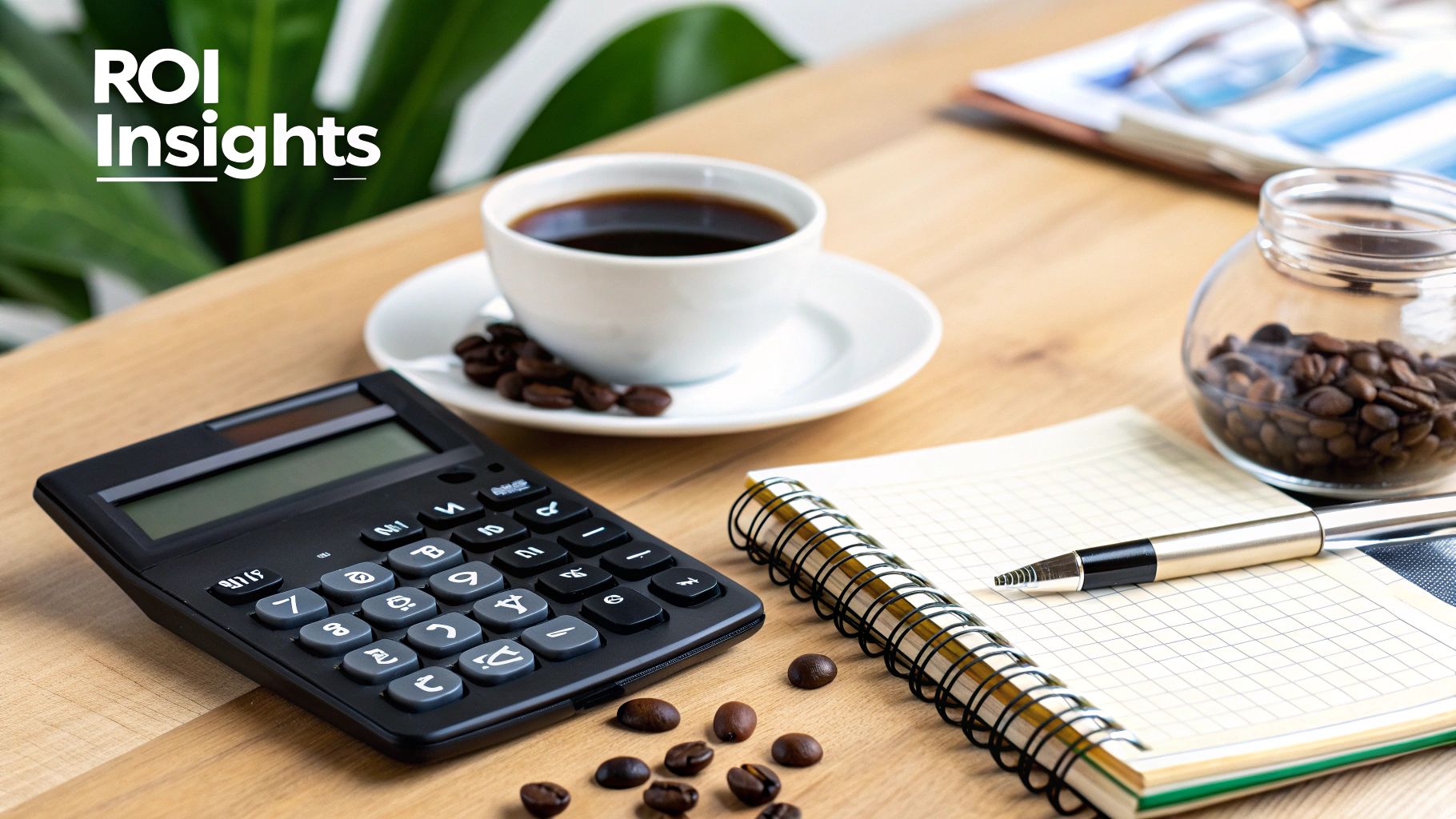
Your gleaming new coffee shop equipment is a serious investment, but its real value comes from the care you put into it. A culture of proactive maintenance is the secret to keeping your machines running smoothly for years, ensuring consistency and protecting your bottom line.
This isn't about frantically calling a technician when things go wrong; it's about building a simple, reliable system of care. A daily, weekly, and monthly rhythm of cleaning and checks keeps everything performing flawlessly, day in and day out. Think of it less as a chore and more as an insurance policy against disaster.
Creating Your Maintenance Routine
A solid maintenance schedule is built on small, consistent actions that eventually become second nature to your team. The best way to do this is to weave these tasks into your opening and closing procedures, turning them from an afterthought into a cornerstone of your quality control.
Here’s a simple framework to get you started:
- Daily Tasks: These are your non-negotiables, the things that prevent immediate problems. Daily backflushing of the espresso machine is vital—it clears out old coffee oils that quickly turn rancid and will absolutely ruin the flavour of your next shot. Wiping down steam wands and cleaning grinder burrs also fall into this daily bucket.
- Weekly Checks: Set aside a bit of time each week for a deeper clean. This is when you'll soak portafilters and baskets in a specialised cleaning solution to dissolve stubborn residue and give the grinder hopper a thorough clean to get rid of stale oils.
- Monthly Inspections: Once a month, it’s time for a more detailed look. Check the grouphead gaskets for signs of wear and tear, and make sure your water filter is still doing its job correctly.
A well-maintained machine is a consistent machine. These simple routines are your first line of defence against flavour contamination and costly mechanical failures, ensuring every coffee served is as perfect as the last.
The Value of Professional Servicing
While daily cleaning is essential, it’s no substitute for a professional’s eye. Scheduling preventative maintenance with a qualified, UK-based technician is one of the smartest financial decisions you can make for your shop. These experts can spot and fix tiny issues before they snowball into major, business-halting problems.
It's just like getting your car serviced. A technician will inspect internal components, replace worn parts, and recalibrate your machine to guarantee it’s running at peak efficiency. This proactive approach massively reduces the risk of a catastrophic failure during your morning rush.
Investing a little in preventative care today will save you a fortune in emergency repairs and lost revenue tomorrow.
Got Questions About Coffee Shop Equipment? We’ve Got Answers.
Diving into the world of coffee shops is thrilling, but let's be honest—it also comes with a mountain of questions. Getting clear, practical answers about coffee shop equipment is one of the best ways to build the confidence you need to get started and turn that dream into a buzzing, successful reality.
Think of this section as a quick chat over a flat white, where we tackle the most common queries we hear from aspiring café owners.
What’s the Real Startup Equipment Cost for a UK Coffee Shop?
For a small to medium-sized speciality spot here in the UK, you should realistically budget between £15,000 and £50,000 for your essential kit. It’s a wide range, I know, but it all depends on your ambition.
The lower end of that scale will get you a solid two-group espresso machine, a quality grinder, a reliable batch brewer, and all the necessary fridges. The higher end? That’s for the top-tier, high-volume machines, multiple specialist grinders for different beans, advanced water filtration systems, and all the extra gear.
Whatever your budget, a smart move is to set aside an extra 10-15% for installation, crucial training, and those first maintenance checks.
Should I Lease or Buy My Coffee Shop Equipment?
This is the big one, and the answer really comes down to your startup capital and long-term business plan. Buying everything outright means you own it, which is definitely cheaper in the long run. But it requires a hefty upfront investment that can really stretch a new business thin.
Leasing, on the other hand, keeps those initial costs down and frees up cash for other vital things like marketing, hiring great staff, or buying amazing coffee. It’s a very popular route for new UK businesses because it often includes maintenance packages and lets you use incredible equipment without emptying your bank account.
Before you decide, always sit down with an accountant and run the numbers. They’ll help you figure out what makes the most sense for your financial model.
While the espresso machine always seems to get the spotlight, any seasoned coffee pro will tell you the grinder has the single greatest impact on flavour.
Think of it this way: a brilliant burr grinder that produces a perfectly consistent, uniform grind is the true foundation of a great extraction. You’ll always get a better-tasting coffee by pairing a fantastic grinder with a good espresso machine than you will by pairing a world-class machine with a subpar grinder. It’s the one piece of kit you should never, ever compromise on.
At Ue Coffee Roasters, we know that the right equipment is the bedrock of your dream cafe. We don't just supply wholesale coffee; we offer expert guidance, professional equipment rental, and full-on barista training to help you nail it from day one. Take a look at our trade solutions and let us help you build something truly special.
